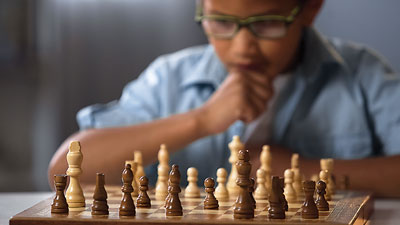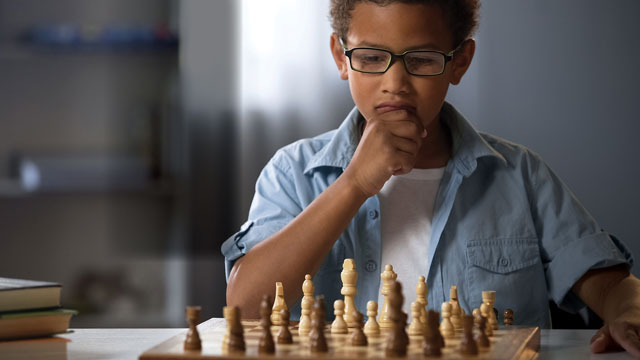We could call 2020 a lot of things, but many of them aren’t fit to print. For the sake of more sensitive readers, let’s just go with The Year of the Board Game! Those dusty boxes stacked high up in closets, purchased some odd years ago as incentive to slow life down and spend more time together (even though it happened once – maybe over Thanksgiving weekend) really came through for us. No doubt, store managers have not experienced such a boom in sales since the mid-nineties. Scrabble and Uno and Monopoly – collecting clues, buying railroads, sinking battleships – this peak popularity of board games absolutely deserves its time in the spotlight.
 Midlothian mom Britny Bassett says game nights at her house are intense. “My 7-year-old is hilarious, but she turns into a cutthroat banker and we can’t get away with anything,” says Bassett. “We have a blended family, so even with everything, this time has been good for us, especially for me because I get to see how great the kids really are without all the demand and rushing.”
Midlothian mom Britny Bassett says game nights at her house are intense. “My 7-year-old is hilarious, but she turns into a cutthroat banker and we can’t get away with anything,” says Bassett. “We have a blended family, so even with everything, this time has been good for us, especially for me because I get to see how great the kids really are without all the demand and rushing.”
Tasha Mitchell, of northern Virginia, says when her college son returned home in early spring, “We finally got to play a game I’ve been wanting to play for three years with him. He sat down and we played, and I was so happy, even though he astutely pointed out the irony of playing Pandemic during a pandemic.”
Board games have reconnected us with our kids. Though they won’t always admit it, our tweens, teenagers, and college students finally got a taste of the good old days. For many families, board games have been a healthy solution to sibling rivalry as well as perpetual boredom (because we all know Candyland can last forever). Board games have also shown us we can be terrible losers and embarrassingly competitive, but equally empathetic and patient teachers. Yes, 2020 is The Year of the Board Game, reminding us about the best parts of our families – and our creative, lighthearted, and clever selves.
We Are All Chess Masters
As parents, we’ve had to be that a lot lately: creative, lighthearted, and clever. We’ve had to think on our feet and solve complex problems while looking ahead – not just one, but four moves – staying mindful of risks and proceeding with caution because the board we’re playing, this version of 2020, has revealed so much opposition.
If you think about it, the one game we probably didn’t bring down to play (because checkers is a heck-of-a-lot easier and Jumanji scares us) is chess. And right now, chess, as a metaphor for life, is a little tough, but we’re proving to be natural chess masters.
I bet you didn’t even realize you could play chess! The truth is, philosophically, we are all chess players, and we get better at it over time. Essentially, we build an arsenal of tools to help us think strategically and make calculated moves toward outsmarting our opponent, whatever it may be, and that knack for defying odds, by itself, is remarkable.
So we have to ask ourselves: If we’re inherently good at chess, how much better could we be at this game of life if we learned the game of chess – for real? If we intentionally traded in our checkers for chess pieces and pushed back on the misconception that chess is too hard, would there be a learning renaissance in the family? Would our chess-playing kids become whippersnappers at navigating life’s challenges?
Essential Benefits for Children
COVID is still wreaking havoc across our nation, but it’s back-to-shool season and we are all searching for the best extracurricular activity, the best afterschool experience, or the best virtual class for our kids. Yes, the season for board games may be slowing down and the season for academic rigor may be arriving, but if your child is five or older, chess checks all the boxes.
It’s a game you want your kids to learn to play for all the reasons that being an adult this year causes us to wince.
By introducing your children to this game and sticking with it, they’ll be stronger, sharper, and more resilient. They’ll be intentional and decisive. You’ll see their creative and clever minds expand, and they will develop focus and stamina. Best of all, your children will learn to treat an opponent with respect and grace because chess is the great equalizer. They’ll be able to shake hands and lose with dignity or win with pride. They might even fall in love with learning.
Can chess really bring about all of this? After all, it’s just a game.
The benefits of chess are immense. The St. Louis Chess Club, widely considered the premier chess facility in the country and among the best in the world, conducts ongoing studies to measure such benefits. From the perspective of a parent and instructor with seven years experience helping kids learn to play chess, I agree with Chess.com’s recent list of benefits. Chess…
• Brings people together.
• Teaches you how to win and lose.
• Helps children realize consequences of their actions.
• Can help improve focus.
• Is a great educational tool in the classroom and at home.
• Develops creativity.
• Builds confidence.
• Develops problem-solving skills.
• Exercises both sides of the brain.
• Helps you learn to be calm under pressure.
I believe parents already know this about the game of chess – the same way they know reading is important, or playing an instrument, or exposure to the arts, or learning through play.
Chess is Having a Moment
Chess has been popular forever. It dates back to sixth century India, and has been known as a reference for military strategy, a metaphor for life, and a benchmark for brilliance – and it’s still trendy. Between Magnus Carlsen, the 29-year-old reigning world champion and grandmaster, and Twitch, the main platform for up-to-the-minute chess happenings, chess feels young and looks cool. Of course, it depends on who you ask, but there is a thriving subculture online, and while other board games might be collecting dust in an attic, chess is living its best life in many a virtual space. Chances are, your kids already know this!
In an article at Chesskid.com, Christina Weiss of the Virginia Scholastic Chess Association based in Hampton Roads, relates how even with traditional education in turmoil, chess has been the one constant in many kids’ lives. Using online resources, Weiss said within days of the spring school closures, their organization transitioned many school and community chess programs to Zoom.
As school systems in the region adapt to distance learning that requires more family participation, chess at home is playing an important role in education. Aditi Wardhan Singh of Richmond says she and her family play the board game regularly. “My son Aarav, who is nine now, started playing first when he was seven,” says Singh. She says her son learned the basics at home, then turned to a chess website to sharpen his skills.
“My daughter Sharvi learned how to play to be able to catch up with her brother,” Singh says. “We play mostly as a family or with friends for bonding and strategy building. My husband and I believe chess is a great way to build a sportsman spirit, teach kids to think of consequences, strategy, and to look at the bigger picture,” says Singh.
How to Get Your Kids Into Chess
So how can your family benefit from chess? Because, we all agree, chess is something we want our kids to learn so they don’t end up like some of us, binge-watching Neflix and stress-eating chips during a pandemic!
1. The first step is to find the game. Chess sets are not expensive, and many families have one in the family room. It may even be an antique set passed down from a favorite relative. Next, take the game out of the box and treat it the same way you would treat backgammon or checkers. Chess is a game. Remember, adults think it’s hard. Kids are eager and willing to view it like any other game they can master.
2. The next step is to see if there is curiosity, like there typically is about any new game. The difference with chess is that it unlocks different levels of curiosity. Eventually, obtaining formal instruction is recommended if you have a highly interested child.
3. Chess can be taught for recreational play by anyone who knows how to play and who is somewhat good with kids, or chess can be taught by a chess player, in the style of tournament chess where the end goal is to compete and carry a certain rating in the world of chess. The two learning tracks are very different and warrant vigilance. All chess players are not good chess teachers, and all good chess teachers are not great chess players. The best thing is to know your child’s needs and interest level, take it one experience at a time, and look for positive reviews and results about the program, coach, or teacher. The right instruction is determined by how chess naturally takes shape in your child’s life.
4. The venue of learning is equally important. For a physical place, choose a program that is scholastic- based and exclusive to children, with structure and an organized curriculum. Some would argue that it is a good thing for children and adults to play each other. The kids can handle it just fine; it’s the adults who are not always able to lose to a 5-year-old with dignity and grace.
5. Lastly, let chess be an organic experience for your child. If your child shows signs of excellence and accelerates in knowledge and confidence, be mindful and provide resources and encouragement, but do not pressure her into becoming a champion, unless or until she is ready or seeks out that desire. I recommend watching the film Searching for Bobby Fischer if you really want to know how to be a good caregiver to a chess player.
As a chess instructor, I often ask my students how they discovered chess. The answer is almost always through a family member. Perhaps the biggest benefit of chess is that it allows families to spend time together, often uniting across generations. My mother, who was a math professor, learned how to play the game by studying chess books in order to beat my father at the game. My brother and I learned eventually, and then I taught my daughter when she was three years old. Now, whenever she and I play, I usually lose, but it’s still fun family competition.
During this time of great uncertainty, let chess become something stable for your family, whether it’s family game night or regular online lessons. Chess has stood the test of time and continues to be relevant with innovative and easily accessible resources. Platforms like Outschool.com provide live instruction, including my own Discover Chess classes which take students on a journey from the basics of chess to tournament play. No matter where your child discovers it, always remember that chess is a game, chess is a sport, chess is friendship. And when played in the proper spirit, chess can be forever.





